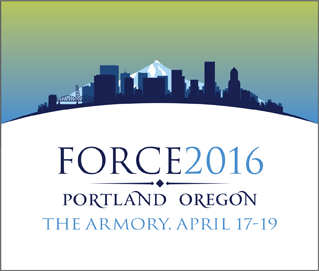Subscribe to our newsletter
Overleaf and Altmetric at FORCE2016 in Portland, Oregon
 Overleaf and Altmetric are at FORCE2016 in Portland, Oregon!
Overleaf and Altmetric are at FORCE2016 in Portland, Oregon!
Stacy Konkiel from Altmetric is co-chairing a session titled “Altmetrics and my career: real barriers or limitations of our minds?” on Monday 18th April, in the Ellen Bye Theater, from 11:45am to 12:45pm
As an emerging measure of research impact, altmetrics are still viewed with skepticism by some corners of the academy. Can altmetrics really uncover useful and high-quality research? How are scientists and humanists actually using altmetrics for professional advancement? How seriously will grant reviewers, tenure and promotion committees, and your colleagues take altmetrics? In this session, researchers will share their uncensored experiences using altmetrics to advance their careers: what worked, what didn’t, and recommendations they have for others interested in using these and other emerging measures of research impact.
Shelly Miller from Overleaf will be running a demo with Caltech on Tuesday 19th April, titled “21st Century Scientific Authoring at Institutions: Demonstrating the Caltech Overleaf Portal”.
The challenge of supporting authorship best practices in the era of Open Science offers research libraries an opportunity to develop and offer a diverse set of tools, training, and user support services that facilitate knowledge sharing. The Caltech Library has responded to this opportunity with an innovative ‘Author Carpentry’ approach that provides convenient access to powerful open science authoring tools and services, along with high-quality training and user support.
An essential component of the Caltech Author Carpentry program is a collaborative and easy to use LaTeX service, offering an integrated development environment (IDE) for authors, combined with a management portal for the Library. LaTex is a well established and highly effective scientific markup system that allows researchers to fully express their ideas and findings in plain text that is openly accessible by both humans and machines, producing outputs that are readily transformed into publication quality papers, presentations, and other professional documents that may be disseminated on paper or online. Moreover, LaTeX outputs are well integrated into the manuscript submission systems of major scientific publishers.
The Library has partnered with Overleaf to develop a customized scientific cloud-based authoring portal that supports scientific authoring in LaTeX for all members of the campus community. Graduate students can rely on the Caltech Overleaf portal to find the thesis template compliant with university requirements including the specifications of the thesis manual and pre-loaded copies of the Caltech logo for the cover page.
This demo will show how Caltech is currently using this authoring portal and enhanced templates which provide Caltech-approved copyright notices, disclaimers, and other elements required by Institute policy for all works disseminated by Caltech authors. It will also show how authors preparing manuscripts for submission to journals and conference proceedings will find templates from publishers with preloaded style guidelines and editorial specifications.
Follow all the Twitter discussion via the #force2016 hashtag. You can also discover conference materials & outputs via Figshare’s conference portal at force16.figshare.com
